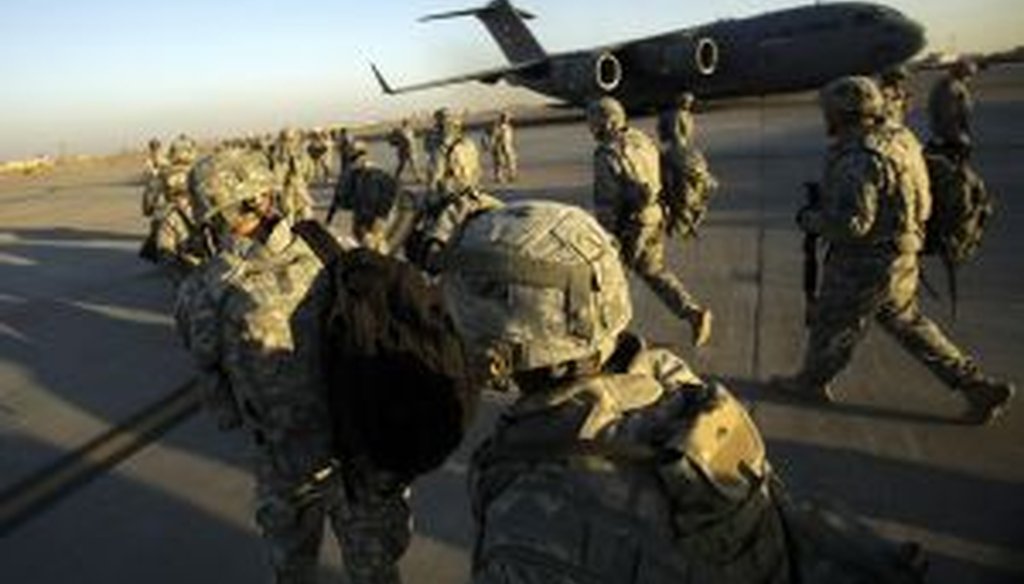Stand up for the facts!
Our only agenda is to publish the truth so you can be an informed participant in democracy.
We need your help.
I would like to contribute

Troops walk toward a C-17 aircraft at Sather Air Base in Iraq. (2010 AP Photo)
Editor's note: This story is part of a series highlighting special issues in light of the presidential election. This installment looks at Iraq and Afghanistan. Previous installments have looked at Medicare, the state of the economy, and immigration.
The wars in Iraq and Afghanistan have claimed thousands of lives and billions of dollars, yet they tend to get lost in the shadows of bigger campaign issues such as the economy and health care. But Barack Obama is a wartime president.
In Iraq, he ended the war as he said he would, closely following the plan set out by his predecessor, President George W. Bush. Obama even kept troops there longer than he pledged during the campaign. But as unpopular as the war was, the pullout left security questions unanswered.
Afghanistan, he said during the campaign, was where America needed to devote its attention and resources and combat the wider terror threat. But as he has learned, the situation there is more unyielding, and Obama’s actions reflect that struggle.
Here’s an assessment of his record on the battlefront.
Iraq deadline met
Starting the day he took office in January 2009, Obama set out a timetable for ending the Iraq war. That culminated with his announcement in October 2011 that all U.S. troops would depart Iraq by Christmas.
"Today, I can report that, as promised, the rest of our troops in Iraq will come home by the end of the year," Obama said at the White House. "Our troops will definitely be home for the holidays."
A small force of a few hundred Marines would remain to help train Iraqi forces, as well as a large diplomatic contingent.
But Obama didn’t adhere perfectly to his promise. The timetable was longer than what he originally set out, and some experts give him credit for that. Michael O’Hanlon, a fellow with the centrist Brookings Institution who generally approves of Obama’s strategies, said Obama first pledged to leave Iraq in 16 months but ended up staying nearly twice as long.
"I actually think that was the right decision," O’Hanlon said. "I think he got the balance about right. And that was based on the realities on the ground in Iraq, not based on the politics here at home."
Jim Phillips, a Middle East analyst at the conservative Heritage Foundation, agreed that more time was better.
"President Obama was wise to drop his campaign promise to withdraw a brigade from Iraq every month once he took office. That would have led to much greater risk in consolidating the gains of the troop surge," Phillips said.
Still, Phillips thinks the pullout in late 2011 was rushed. Even though that deadline was set by the Bush administration, it was widely expected that it would be extended.
Obama’s team failed to negotiate an extension because Iraqi authorities would not bend on one key point: granting immunity to U.S. forces in Iraqi courts.
"That’s something we’ve never agreed to," said Todd Harrison, senior fellow for defense budget studies at the Center for Strategic and Budgetary Assessments. "We typically negotiate an agreement where our troops are only subject to our laws."
Once that stalemate sunk in, Obama announced the full withdrawal. Within weeks of the withdrawal announcement, the Obama campaign put out an ad claiming credit for ending the combat mission. PolitiFact rated it Half True.
"I think in both countries there was a tendency to go with what would be internally politically popular," the Heritage Foundation’s Phillips said. "It wasn’t just an American thing. I think the Iraqis turned their back on the need for continued military support."
As a result, Phillips said, the United States now has less political coverage within the country, while Iran’s influence has increased.
Added O’Hanlon: "Iraq is obviously fragile. We see that in the bombings that still take place every week." For example, the BBC reported last week that July was the deadliest month in nearly two years; Iraqi officials said that 325 people died in attacks, including one day in which 103 people were killed in a wave of bombings.
Beginning of the end
In Afghanistan, Obama intensified the war even as he promised to end it.
Immediately after taking office, Obama signed an order increasing the number of troops in Afghanistan. A few months later, he increased it again, a move known as the troop surge.
He added more troops but vowed the increase would be temporary. He stepped up operations while setting a deadline for their conclusion. "On balance, he projected a certain amount of ambivalence," said O’Hanlon of Brookings.
The United States went from approximately 31,000 troops deployed to Afghanistan at the end of 2008 to about 71,000 a year later. The peak was 111,000 in 2011.
"What I think is striking is that he more than tripled the number of troops in Afghanistan during the first two years he was in office," said Harrison, the defense budget expert. After remaining between 20,000 and 30,000 throughout the Bush administration, "to suddenly go over 100,000 — that was a big change in policy."
Now the drawdown is under way, with a planned level of 68,000 by the end of the summer. The United States will transition out of a combat role and into a support role by the end of 2014.
In the meantime, a Pew Research survey in March found that 57 percent of Americans favor pulling U.S. troops out of Afghanistan as soon as possible.
To Danielle Pletka, a conservative analyst for the American Enterprise Institute, setting hard deadlines appeared like nothing but "a very simple political calculation."
"He knows that his base hates (the war)," she said.
The result, Pletka said, is that "the president under-resourced the strategy that he approved. It’s kind of like giving someone a recipe and then not giving them the ingredients."
After interviewing Obama’s national security advisers, David Sanger of the New York Times reported that Obama "concluded in his first year that the Bush-era dream of remaking Afghanistan was a fantasy. … So he narrowed the goals in Afghanistan, and narrowed them again, until he could make the case that America had achieved limited objectives in a war that was, in any traditional sense, unwinnable."
Meanwhile, Obama has shown startling willingness to employ and expand the use of drones in Afghanistan, as well as emerging terrorist hot spots including Pakistan and Yemen, to defeat al-Qaida. The strategy is a powder keg of controversy — liberals and other nations are bothered by the moral implications of these anonymous assassinations, while Republicans have criticized leaks about the program and suggested Obama authorized them. In another sense, however, the drone campaign has blunted suggestions that Obama might have been weak on defense.
Another concrete sign of his wartime resolve: the killing of Osama bin Laden.
Obama announced on May 1, 2011, that the world’s most notorious terrorist had been killed in a U.S.-led raid in Abottabad, Pakistan. No Americans were killed in the risky operation, which Obama watched unfold live from the White House. Bin Laden’s death sparked jubilant celebrations in the United States, including at ground zero in New York.
PolitiFact marked the event as a Promise Kept.
"I think it’s a clear success in the counterterrorism mission. He’s got that in the win column, and I think that al-Qaida has been significantly weakened," said Linda Robinson, a senior fellow for U.S. National Security and Foreign Policy at the Council on Foreign Relations. "Just killing Osama bin Laden doesn’t take care of all the problems on the al-Qaida front, but it provides a really important psychological advantage now, and I think there’s a sense that people feel we’ve kind of broken the back of that organization."
Are we better off?
Harrison, a defense budget expert, did a couple of cost calculations on the two wars and came up with staggering numbers.
Including the expenses of vehicles, planes, fuel, ammunition, equipment, housing, food, laundry and paying thousands of support contractors, it costs $800,000 per troop per year in Iraq.
In Afghanistan, which has the added challenges of poor roads, limited electrical grids and is landlocked, that figure is $1.2 million.
Per troop, per year.
"It’s been very difficult to get supplies in and very expensive," Harrison said. "And then those supply routes have to be protected. You have to fly more planes over them, you have to have more vehicles in the convoy to provide protections. And all of those things are using fuel and supplies as well. The expenses are cascading."
So as operations in both countries wind down, the costs savings are unquestioned. But little else is that clear-cut.
In Afghanistan, the Taliban has made a resurgence, and nearby Pakistan has emerged as a possible terrorist haven.
Robinson, with the Council on Foreign Relations, said that necessitates the United States maintaining a sizable troop presence even past the 2014 deadline.
"I think people unfortunately have set the bar too high for Afghanistan. They’re only going to make progress in a very gradual way," said Robinson. "It’s worth making some additional investment to help."
And even Iraq, where the situation is more settled, has its own uncertainties.
"What’s hard to measure is security threats that may come out of Iraq in the future, because we left so abruptly," said Phillips, from the Heritage Foundation. "Al-Qaida in Iraq is moving arms and people into Syria and could emerge much stronger than it already is, and that could be a price that the U.S. will have to pay down the road."
Our Sources
See individual promises and fact-checks for complete sources.


















































